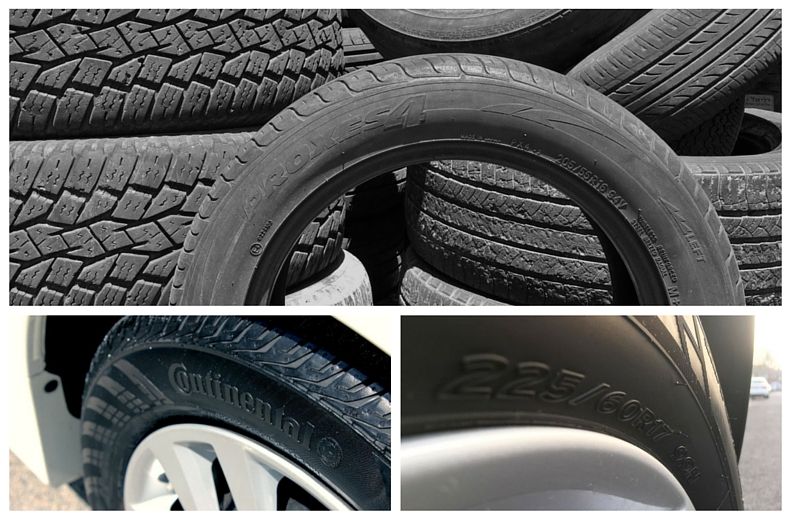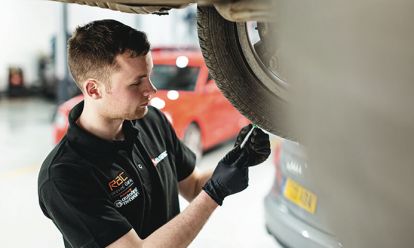So to cut through the confusion, here's everything you should consider when buying tyres for your car.
Are you concerned about your tyres? Check with your local mobile mechanic.
Buying your car tyres
Before you can choose a new car tyre, you’ll need the exact measurements for your car’s tyres. This information is printed on the sidewall of a tyre.
.jpg)
All car tyre size information is standardised, so it is the same for all tyres.
An example is a tyre carrying the size lettering: 205/55 R16 91W.
205: the tyre’s width, in mm
55: the tyre’s side profile, as a percentage of the width (a smaller number here indicates a ‘low profile’ tyre)
R16: the diameter of wheel the tyre will fit, in inches
91: the tyre’s load index – the load capacity of the tyre (91 = 615kg)
W: the speed rating of the tyre – so you can match the ability of the tyre to the top speed of the car (W = 168mph)
After buying your tyres
After you have invested in the right tyres it is just as important that you ensure they are well maintained and kept in the correct state.
Regularly checking the state of your tyres isn't just crucial for your safety but is also essential to make sure your tyres are in the correct legally-required state.
Watch this quick video to learn how to check your tyres, including the tread depth.
In addition to road-legal checks it is also important to carry out regular tyre pressure checks, especially before a long journey.
What to look for when buying a tyre?
If you are in the market for some new tyres, then it is essential to consider several factors to ensure you choose the right ones for your vehicle and driving needs.
As explained, check the size and condition of the tyre – as well as the ratings that they have.
You may also want to consider buying winter tyres or performance tyres, based on your driving conditions and the personal preferences of the driver.
No matter what you select, the tread pattern should be suitable for your driving conditions. You should also check for a tyre with a tread life warranty if possible.
The load rating, wet driving, and speed rating will also need to be looked at before making a purchase. They will also have a fuel efficiency rating.
Before buying, set a budget and keep in mind that quality tyres are an investment in safety and performance, so avoid compromising too much on quality for cost savings. Look at the warranty available as well.
Best ways to look after your tyres
Proper tyre maintenance is essential for safety, performance, and longevity. Looking after your tyres will help you save money in the long run.
There are a few ways to ensure your tyres can last for a long time.
You should always maintain the recommended tyre pressure as specified in your vehicle's owner's manual. If the tyres are underinflated, for example, they may suffer from premature wear and increase the vehicle's fuel consumption. Overinflated tyres can make the handling of the vehicle unpredictable and produce uneven tyre wear.
This is also true for heavily worn tyres. Check the tread depth by using a gauge or 20p and if the tread is worn down to an unsafe level then it's time to replace the tyre.
When you next visit your local garage, ask them to check that your wheels are aligned correctly, to avoid uneven wear, or steering problems.
Drivers throughout the year should also avoid overloading the vehicle, as excess weight can put extra strain on tyres and lead to premature wear and reduced performance.
And no matter the time of year or road conditions, do not have an aggressive driving style as this will put strain on the tyre and accelerate wear and tear.
Due to the condition of UK roads, you should always avoid (where possible) potholes and other road imperfections.
As part of your regular car maintenance, you should always inspect your tyres for signs of damage. This also goes for your spare tyres.
Finally, you should always replace tyres when they are worn out, damaged, or have aged beyond their useful life, even if the tread depth appears adequate. This is for the safety of both you and other road users.

Breakdown cover from £5.29 a month for Standard cover*
• Cheaper than AA Price Promise or we’ll beat it by 20%^
• We get to most breakdowns in 60 mins or less
• Our patrols fix 4/5 breakdowns on the spot















